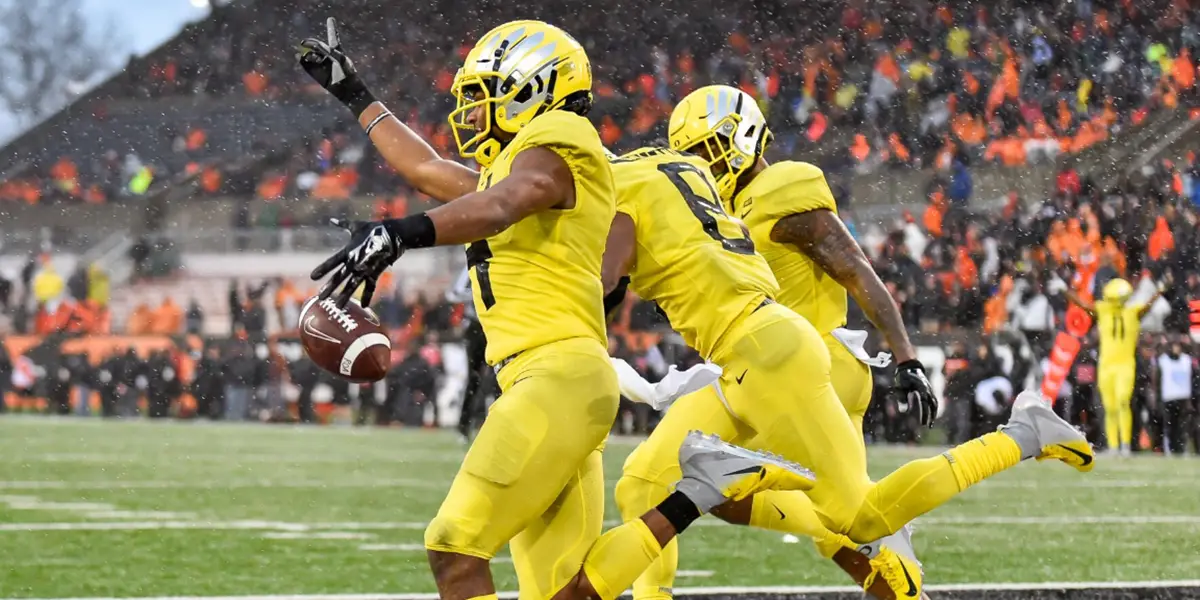(To the tune of Maggie’s Farm by Bob Dylan)
I ain’t goin’ to work on
Emmert’s farm no more.
No, I ain’t goin’ to work on
Emmert’s farm no more.
He hands you a nickel!
He hands you a dime!
Coach is makin’ millions,
From my body on the line.
The fans, it’s me they adore.
No, I ain’t goin’ to work on
Emmert’s farm no more.
OPENING SCENE: Sheldon High School Football Field, Eugene, Oregon
ACTION: Justin Herbert, full Ducks kit sans helmet, looks to his right and spots his likely kitted brother Patrick. “Go deep, bro!” Patrick streaks down the field. Justin drops a 60-yard dime into Patrick’s outstretched hands. As Patrick streaks into the end zone, Justin turns, signals and shouts “Touchdown!”
“Hello friends,” he says, sauntering toward the camera, light-brown curls bouncing softly off his shoulder pads. “I’m Justin Herbert, and I play quarterback for the University of Oregon (flashes ‘O’ sign.)
I’m here to tell you folks that you don’t have to suit up to get into the game.
All you need to do is to make the short drive to the Lucky Coastal Casino.
There you will find great rooms, great food, great golf and the chance to make a winning play.”
Hulking offensive line enters from stage left, kneeling down in front of Justin.
“And you don’t need big uglies like these guys to give you time to make a throw on the Pass Line.“
“Big Uglies!?” responds the line in chorus, proceeding to playfully dog-tackle and pummel their star quarterback.
Suddenly, Justin’s head emerges from the pile!
“So, get to Lucky Coastal Casino, get in the game and bring home some Oregon green!“
(Cue fast, lawyerly voice: “You must be 21 years of age to wager at Lucky Coastal Casino. There is no guarantee that you will win more than you wager. Betting is for entertainment purposes only.”)
And… Cut!
Crazy? Maybe. But under pay-for play pressure, the NCAA and its Nattering Nabob of Nothingness Mark Emmert have formed a committee to study whether college sports should adopt the “Olympic model,” whereby an individual athlete is allowed to sell his or her own likeness without loss of eligibility. Under this model, student-athletes would be permitted to profit from their name recognition while maintaining their “amateur” status.
Under the proposed Olympic model, colleges would be prohibited from affirmatively introducing an athlete to a commercial opportunity. But college athletes would be allowed to market their likenesses in any manner they see fit without loss of scholarship or eligibility, and in doing so would be free to reference their university and wear their team uniform. The money earned by an individual would be his or hers alone.
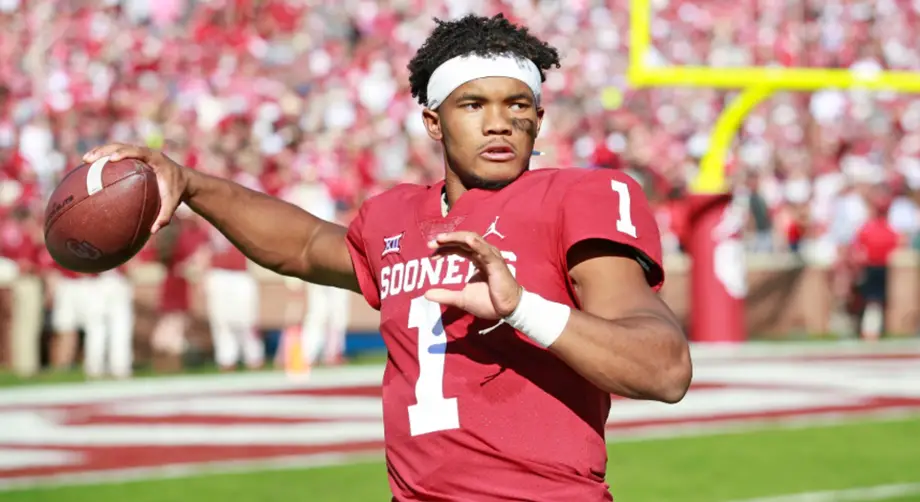
Murray was able to benefit from a loophole in the NCAA’s system.
Under current rules, a student-athlete can play one professional sport and retain college eligibility in another. Last season’s Heisman winner Kyler Murray accepted a $5 million signing bonus from the Oakland A’s while playing quarterback for Oklahoma. Under the Olympic model, while student-athletes would still be ineligible to claim amateur status in a particular sport once they’ve signed a contract with a professional team, they would be allowed to earn revenue based on their likenesses and remain eligible in their preferred sport.
Additionally, a college athlete would be allowed to hire an approved agent to help him or her find endorsement opportunities individually or as a team.
“Hi, we’re the University of Colorado ski team and we don’t ski on any boards not made by K2.“
Another proposal is under consideration as well: a student athlete would be allowed to sign with an approved agent and receive benefits paid to his or her family while maintaining his or her college eligibility.
Holy Reggie Bush! Will Bush one day get his Heisman trophy back? Will ‘SC be backpaid an additional 30 scholarships? (Was Bush the only player whose family received free rent?)
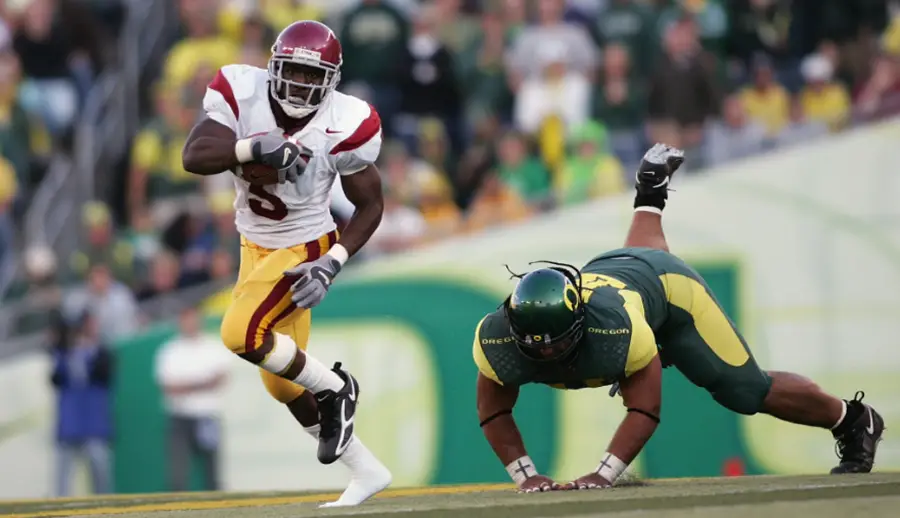
Will a rule change vindicate Bush?
Okay, the star players may benefit. But what about the average Joes and Janes, the teammates who ball out in support of their star player’s earning power? In our opening scene, the linemen also make bank, but would this be the case in the real world? What kind of locker room resentment would be fostered if the college “stars” make big bucks while their supporting crew are handed a mere scholarship and stipend? Professional athletes accept and understand the disparity in salaries. An All-Pro left tackle is going to make more than an All-Pro left guard. A starting pitcher gets more than a middle-inning relief pitcher. Will college athletes in their teens and young twenties accommodate the disparity in like manner?
Obviously, the Sooners players did not resent Murray being handed a big check by the A’s. But would the response be the same if Murray, wearing his football uniform, was paid big bucks to rep an Edmond, Oklahoma Chevy dealer, cashing in on the success of the team and the goodwill of the program’s legacy?
We’ve seen negative corporate influence on the world of college basketball. Would the Olympic model be capable of regulation across all collegiate sports? The NCAA’s track record of regulating extra benefits has not been good. Would legalization facilitate regulation?
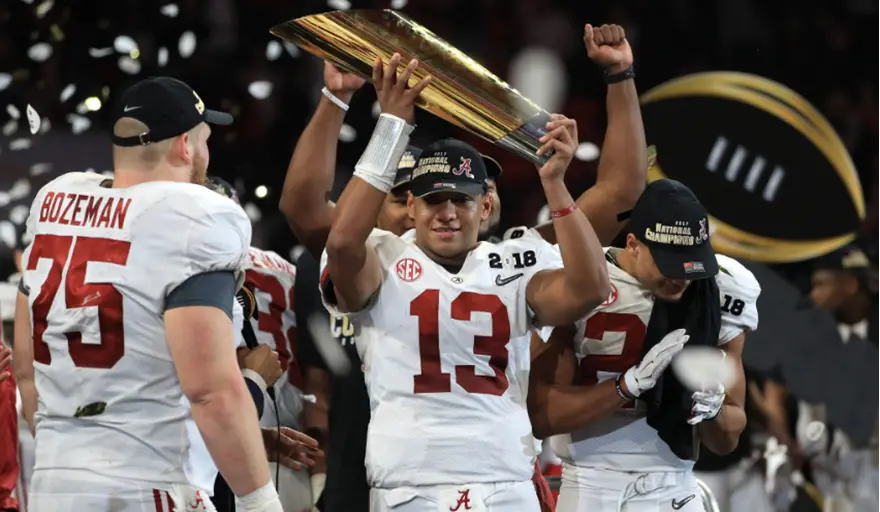
Superstars like Tua Tagovailoa would benefit tremendously from these proposed rule changes.
Is adopting the Olympic model for college sports a logical progression? Will it quiet the cries of inequity when coaches make millions while the players toil “for free on Emmert’s farm?”
CLOSING SCENE: Trail Blazers’ Basketball Court, Portland, Oregon.
ACTION: Sabrina Ionescu, in her Oregon uniform, dribbles a basketball, eyes locked straight ahead.
“Hi, I’m Sabrina Ionescu and I play basketball for the Oregon Ducks. I never do this (intentionally double-dribbling). Except, when I’m wearing a diner’s bib at Ducks’ Delight Barbecue in Eugene. At Ducks Delight, when you’re ravaging righteous barbecue, it’s perfectly acceptable to double, triple, even quadruple dribble.
See ya there friends (flashes ‘O’ sign). Go Ducks!“
Like it or not, “Pay for play” is coming. Is the proposed Olympic model the best way to regulate it?
The answer, my friends, is blowin’ in the wind.
Jon Joseph
Georgetown, Texas Top Photo by Kevin Cline

Phil Anderson, the FishDuck.com Volunteer editor for this article, is a trial lawyer in Bend Oregon.
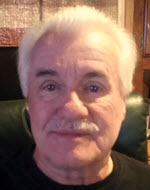
Jon Joseph grew up in Boston, Massachusetts but has been blessed to have lived long enough in the west to have exorcised all east coast bias. He played football in college and has passionately followed the game for seven decades. A retired corporate attorney Jon has lectured across the country and published numerous articles on banking and gaming law. Now a resident of Aiken South Carolina, Jon follows college football across the nation with a focus on the Conference of Champions and the Ducks.

